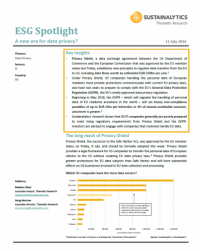finance sociale et investissement responsable Nouvelles diverses
Rapport de l’ESMA : les fonds ESG performent mieux !
Ivan Tchotourian 6 avril 2022
L’Autorité européenne des marchés financiers (AEMF ou ESMA) viennent de publier un rapport soulignant la meilleure performance des fonds ESG.
Extrait
The European Securities and Markets Authority (ESMA), the EU securities regulator, today publishes its fourth annual statistical report on the cost and performance of European Union (EU) retail investment products. A new finding this year is that UCITS with an environmental, social and governance (ESG) strategy (including equity, bond and mixed funds) outperformed their non-ESG peers, and were also overall cheaper.
- Gross performance: Gross performance in 2020 was low or negative and highly volatile due to the COVID-19 pandemic. Investing long-term significantly reduces the risks related to sudden and large changes in the valuation of financial products;
- Costs: Costs remained a critical component when evaluating the ultimate benefits of an investment, they reduced only marginally over time. Total costs were higher for retail investors than for institutional investors, on average. Costs for cross-border funds were higher than those for domestic funds;
- ESG UCITS: ESG equity, bond and mixed funds were overall cheaper than non-ESG peers, while their performance reflected the strong performance of specific sectors since the COVID-19 crisis. Within the ESG fund category, impact funds performed better than other ESG strategies and funds with sustainable investment as objective performed better in net terms, after having included costs, than those promoting environmental or social characteristics despite slightly higher costs;
- Structural market features: 15% of the managers of UCITS in our sample managed 90% of assets. Cross-border funds were, on average, larger than funds sold only in their home market and on average 60% of funds included in the sample were effectively sold cross-border. Heterogeneity across Member States persists;
- Performance and costs by management type: Costs were significantly higher for active UCITS than for passive funds and ETFs. ETF UCITS performance was in line with that of other passive UCITS investing in similar assets;
- Retail AIFs: In 2020, retail investors accounted for only 13% of the total Net Asset Value (NAV) in the EU AIF market. As for UCITS, the annualised monthly gross and net performance across the main retail AIFs fund types, significantly decreased compared with 2019. A full costs analysis could not be carried out due to the unavailability of data on cost composition; and
- Structured Retail Products: Total costs were largely attributable to entry costs and varied substantially by country and by pay-off type, but they did not depend on issuance size or underlying type.
Pour en savoir plus, cliquez ici
À la prochaine…
Gouvernance Normes d'encadrement normes de droit normes de marché Nouvelles diverses
Devoirs fiduciaires des intermédiaires : une ouverture à la RSE
Ivan Tchotourian 7 mars 2017
Sur l’Oxford Business Law Blog, Brian Tomlinson propose de revenir sur la dernière publication de la Law Commission britannique : « Fiduciary Duties of Investment Intermediaries ».
Dans un excellent billet intitulé « Sustainability and Fiduciary Duties in the UK: Legal Analysis, Investor Processes and Policy Recommendations », M. Tomlinson résume la vision de la commission législative et… sans surprise le fait que rien n’empêche un intermédiaire de prendre en compte la RSE dans ses critères de placement !
Fiduciary duties are foundational for institutional investors. The interpretation of these duties frames investment time-horizons, strategies and objectives, and defines those features of the investment landscape considered appropriate subjects of analysis.
Some institutional investors, whether asset owners or investment managers, have defined their fiduciary duties in narrow terms, arguing that they preclude consideration of Environmental, Social and Governance (‘ESG’) factors in investment processes. This approach has often been informed by the mischaracterization of sustainability concepts in legal advice and short-term investment strategies. These misunderstand the position in law and regulation in the UK, fail to reflect the investment approach of major asset owners and data on the relevance of ESG methodologies to risk and return analysis.
Fiduciary duty is not a barrier to ESG integration. The UK Law Commission, in its report The Fiduciary Duties of Investment Intermediaries, stated that ‘there is no impediment to trustees taking account of environmental, social or governance factors where they are, or may be, financially material’. The relevance of an investment factor is determined by its financial materiality rather than its origin or the label applied to it.
À la prochaine…
Ivan Tchotourian
autres publications Nouvelles diverses
ESG Spotlight : A new era for data privacy? (billet de Julie Bernard)
Julie Bernard30 juillet 2016
Bonjour à toutes et à tous, l’agence de notation extrafinancière Sustanalytics vient tout juste de sortir un nouveau rapport dans le cadre de la série ESG Spotlight : « ESG Spotlight | A new era for data privacy? ».
En voici un résumé :
Sustainalytics’ new ESG Spotlight Series report, A New Era for Data Privacy?, considers the impacts of the new Privacy Shield agreement, which was approved by the EU member states last Friday, on US IT companies. Our research shows that US IT companies generally are poorly prepared to meet rising regulatory requirements from Privacy Shield and the General Data Protection Regulation (GDPR).
Bonne lecture !
Julie Bernard, MAP, Adm.A
Étudiante au doctorat (PhD) en sciences de l’administration (Management)
Faculté des sciences de l’administration
Université Laval
